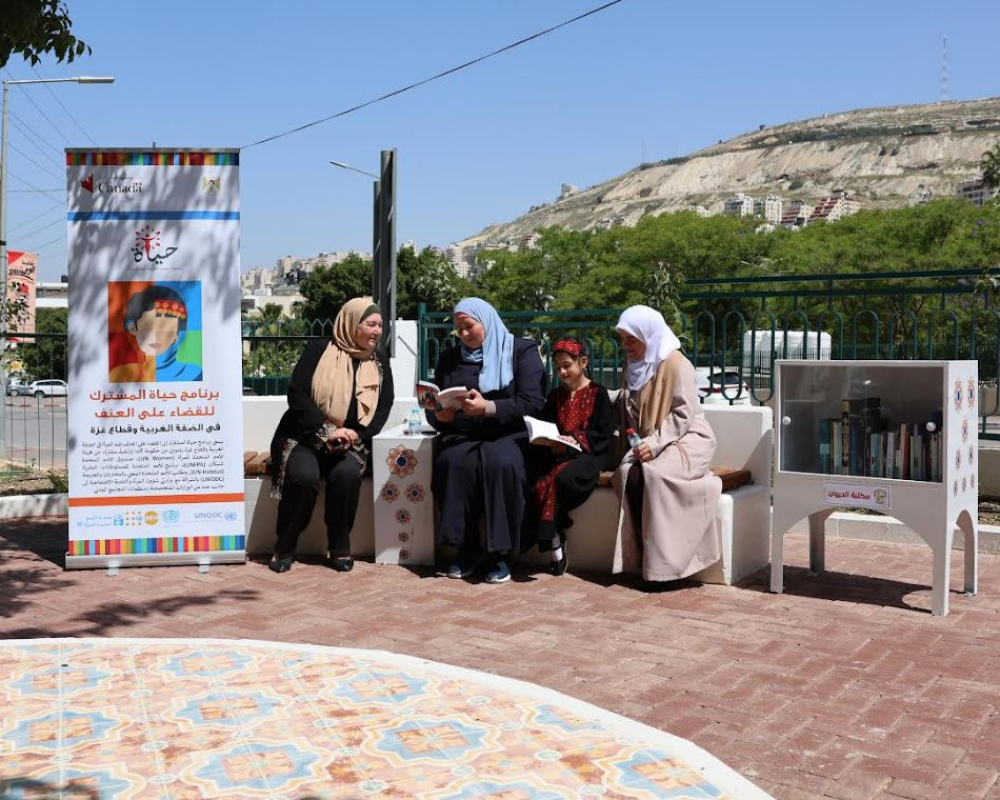
Nablus /PNN/
Through the HAYA Joint Programme funded by the Government of Canada, UN-Habitat, in partnership with the Ministry of Local Government and the Nablus Municipality, inaugurated the newly rehabilitated safe, inclusive, and accessible community garden for citizens in Nablus.
In early 2021, a city-wide public space assessment evaluated public spaces in various Palestinian cities in the West Bank and Gaza Strip, including 60 public spaces in the city of Nablus. Results of this assessment found that 25 per cent of these public spaces face physical and social challenges that make them unsafe and lacking inclusivity.
After discussions with the municipality and the local community, it was decided to rehabilitate a communal space for the whole community, including women, men, girls, boys, people with disabilities, and elderly people. The open air Al Diwan (meaning "the gathering place”) community garden was chosen due to its location in the heart of a number of well-known public areas in the city, including Jamal Abdul Nasser parks, the municipal playground, and the Families Garden.
The primary goal was to design a public space that would provide an added value to the community while enhancing the inclusivity and accessibility of the city. A design session was then convened with members of the local community in Nablus, and spaces for social interaction were identified as one of the key needs. A design was then developed that incorporated these needs including comfortable seating areas for social gatherings, areas for mentally challenging activities such as board games and playing cards, an exercise area with adequate fitness equipment, and a reading corner with books later donated by the Nablus City Library.
Ms. Tamam Khader, a community member who uses Al Diwan Garden said, “The garden is a very important space, especially for women in Nablus city.” She also complemented the design which allowed everyone the opportunity to enjoy it, whether women, elderly people, and people with disabilities. She said that a safe place where people can socialize had been something the city had been missing. “I am so happy to see the ideas we shared during the design sessions reflected and come to life.”
The garden’s rehabilitation also included an entrance with wheelchair ramps and an accessible walking trail as well as fitness equipment to encourage exercise and a healthy lifestyle. Patches of land were also added where visitors interested in urban gardening could plant herbs and other plants.
In his welcoming remarks, his Excellency the Minister of Local Government, Mr. Majdi Al Saleh emphasized that, “Through its strategic plans, the Ministry of Local Government supports the establishment of parks and public spaces for all groups, whether younger or older, women or men, and designed in a way that provides freedom of access and safe use by citizens.” His Excellency explained that the Ministry heads a national committee in support of this and added, “Public spaces are an extension of our homes and an outlet for all of us to spend happy times with family and friends, so we must preserve and protect them like we would our homes.”
The newly designed garden features traditional Palestinian colours and design elements, including locally made coloured tiles, a central water fountain as found it traditional homes, and local greenery. These all create a familiar atmosphere for residents, encouraging them to spend comfortable and long hours in the garden.
Mr. Zeyad Elshakra, Head of UN-Habitat Country Programme in Palestine stressed, “We, as UN-Habitat, are continuing our social and development work, hand in hand with municipalities and local and international institutions as one team to improve the economic, social, and environmental conditions for members of the local community, to build safer and more sustainable cities.”
Places such as Al Diwan are especially needed in Palestine where there are not enough safe and inclusive public spaces to meet the needs of the community. Providing safe and inclusive public spaces contributes to protecting women from violence by facilitating their access to basic services, benefiting from education and employment opportunities, and enhancing their participation in civic life. UN-Habitat continues to partner and help strengthen the capacity of national and local governments to promote safe, inclusive, accessible, and violence-free public spaces for all Palestinian communities.
The HAYA Joint Programme seeks to eliminate violence against women in the West Bank and Gaza Strip. HAYA is funded by the Government of Canada and is jointly implemented by the United Nations Entity for Gender Equality and the Empowerment of Women (UN Women), the United Nations Population Fund (UNFPA), the United Nations Human Settlements Programme (UN–Habitat), and the United Nations Office on Drugs and Crime (UNODC), in partnership with the Ministry of Women’s Affairs and the Ministry of Social Development as well as other ministries and civil society organizations.